1. Choose Rubber Casters or Polyurethane Casters
When it comes to ensuring the smooth operation of everything from industrial equipment to everyday office chairs, the choice of caster wheels plays a pivotal role. While there are various materials to choose from, polyurethane and rubber wheels stand out as popular options, each with its unique properties and benefits. This article delves into the world of caster wheels, specifically comparing polyurethane wheels to rubber wheels, to help you make an informed decision for your specific needs.
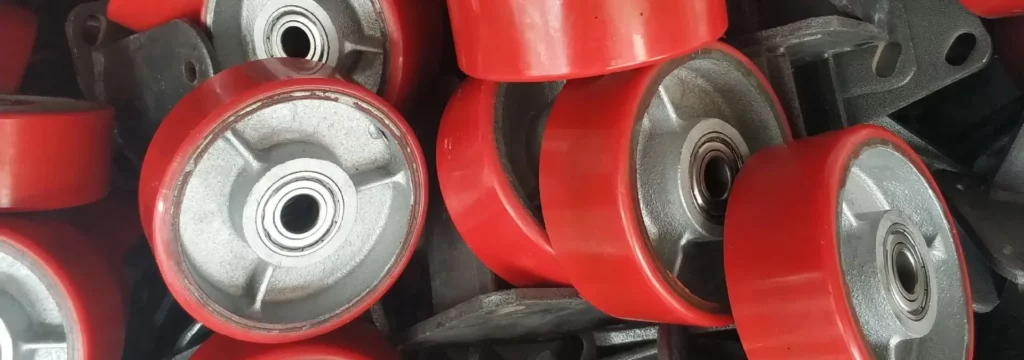
2. Understanding Polyurethane Casters
Polyurethane casters are a type of wheel commonly used in a variety of settings, from industrial to commercial and even in home environments. These casters are made from a synthetic material known as polyurethane, a versatile polymer that can be engineered to various levels of hardness and resilience.
Characteristics of Polyurethane Material
- Dayanıklılık: Polyurethane is known for its exceptional durability. Unlike some other materials, it doesn’t easily crack, break, or wear away, making it ideal for long-term use.
- Flexibility: Despite its strength, polyurethane also offers a degree of flexibility, which helps in absorbing shocks and reducing noise when moving over uneven surfaces.
- Load-bearing Capacity: One of the standout features of polyurethane wheels is their high load-bearing capacity, allowing them to support heavy weights without deforming or breaking.
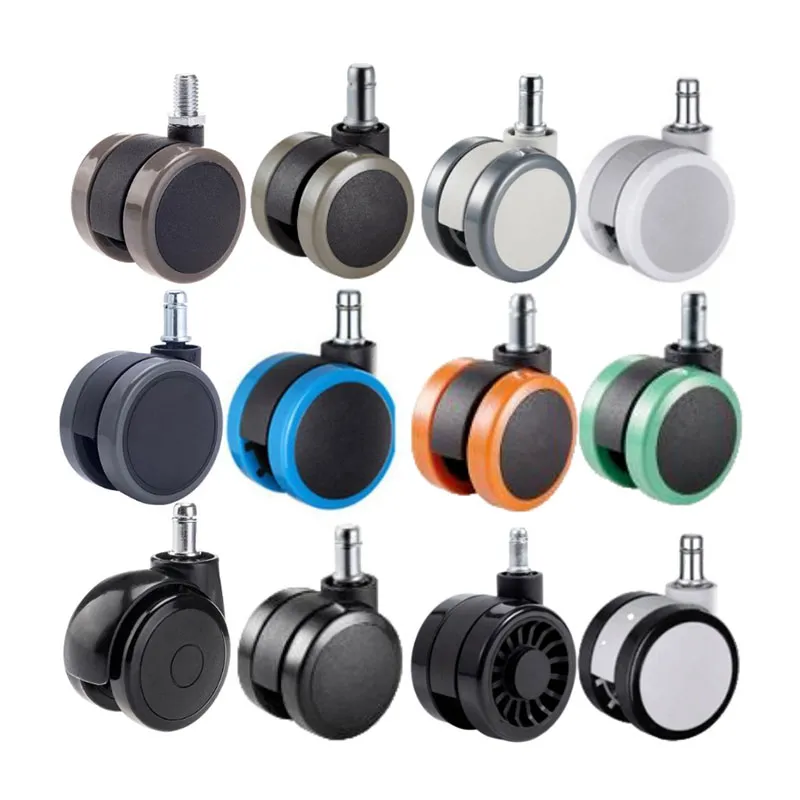
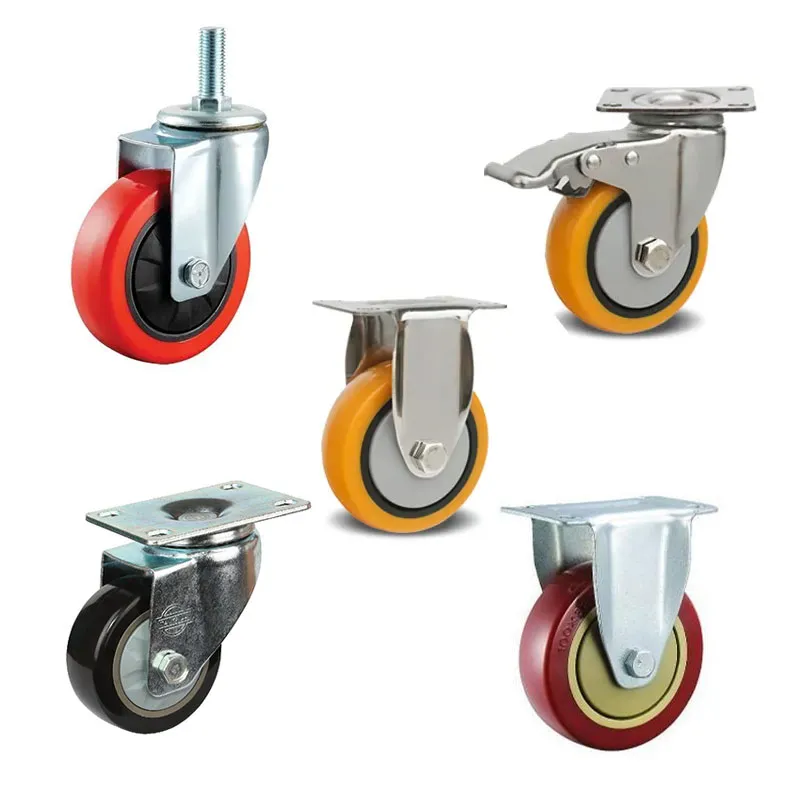
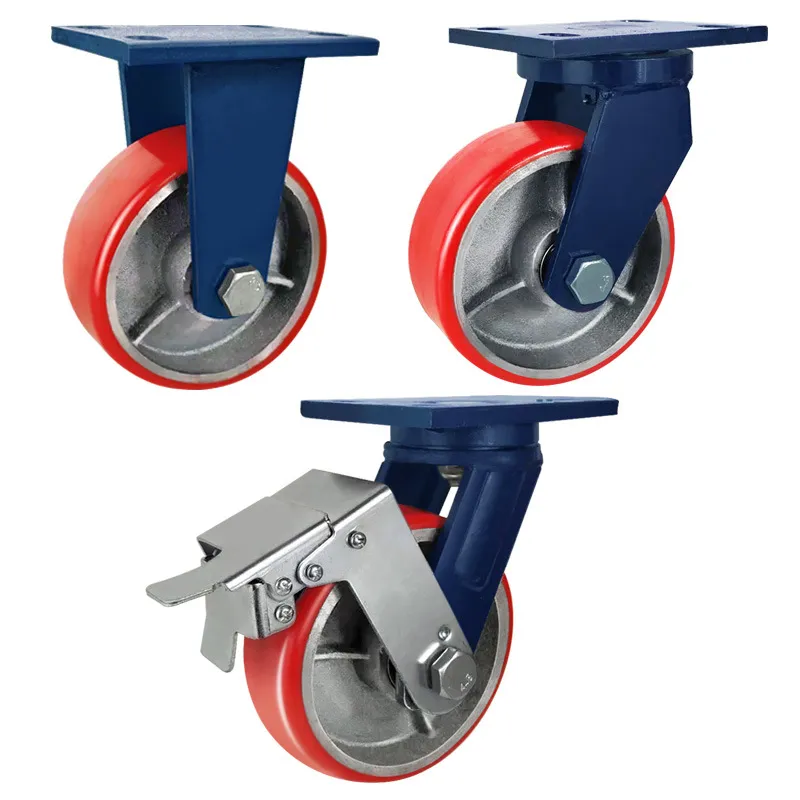
Advantages of Polyurethane Wheels
- High Wear Resistance: Polyurethane wheels are less prone to wear and tear, even in high-use scenarios, ensuring longevity and consistency in performance.
- Enhanced Chemical Resistance: These wheels can withstand exposure to various chemicals, oils, and greases, making them suitable for challenging industrial environments.
- Suitability for a Range of Floor Types: Whether it’s smooth concrete, tiled floors, or even some outdoor surfaces, polyurethane casters provide good traction and stability.
Disadvantages
- Cost Considerations: Generally, polyurethane casters can be more expensive upfront than their rubber counterparts, though this can be offset by their longer lifespan.
- Sensitivity to Environmental Factors: In some extreme temperatures or under direct sunlight, polyurethane can degrade more quickly, requiring consideration of the operating environment.
3. Exploring Rubber Casters
Definition of Rubber Casters
Rubber casters are wheels made from natural or synthetic rubber, widely used for various applications due to their versatility and şok emici properties. These casters are favored in environments where noise reduction and floor protection are priorities.
Characteristics of Rubber Material
- Elasticity: The rubber’s inherent elasticity allows it to absorb shocks and vibrations, providing a smoother ride over bumpy or uneven surfaces.
- Şok Emilimi: This feature makes rubber wheels particularly suitable for equipment that needs to be protected from jolts and vibrations during movement.
- Grip on Various Surfaces: Rubber casters offer excellent grip and traction, reducing the risk of slipping, especially on slick or wet surfaces.
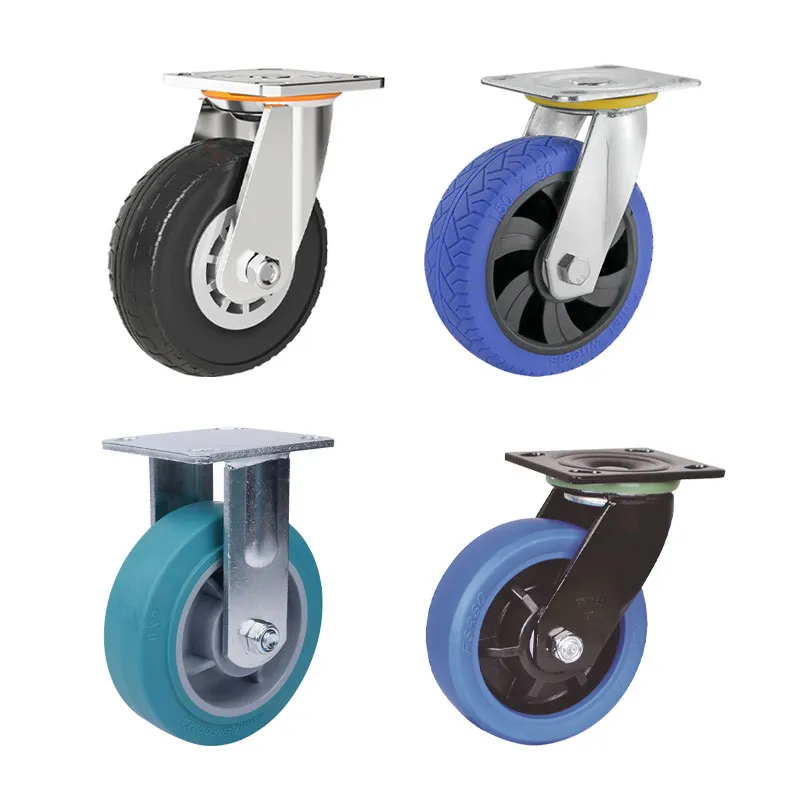
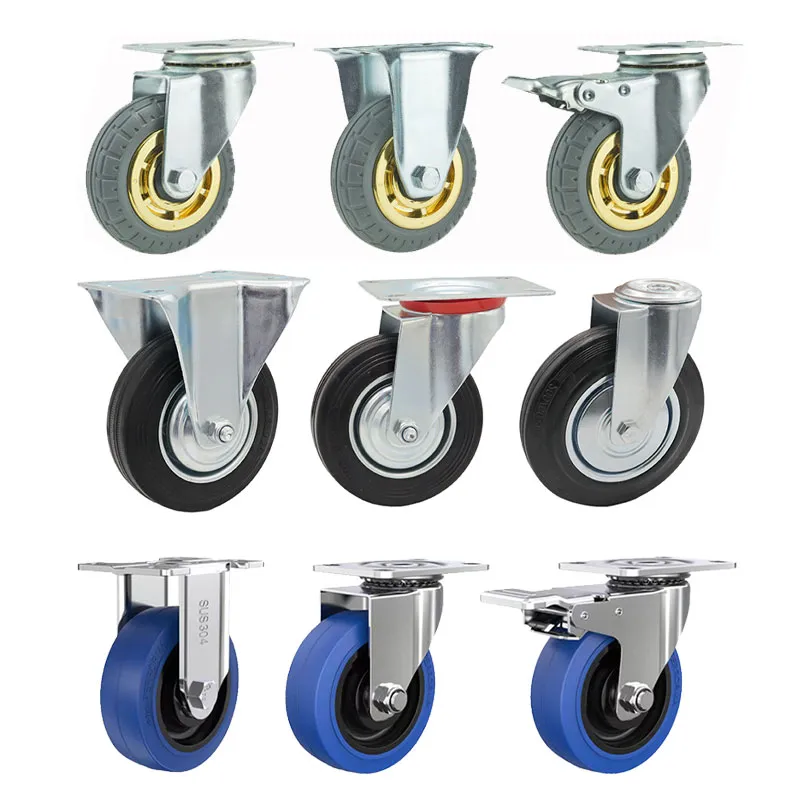
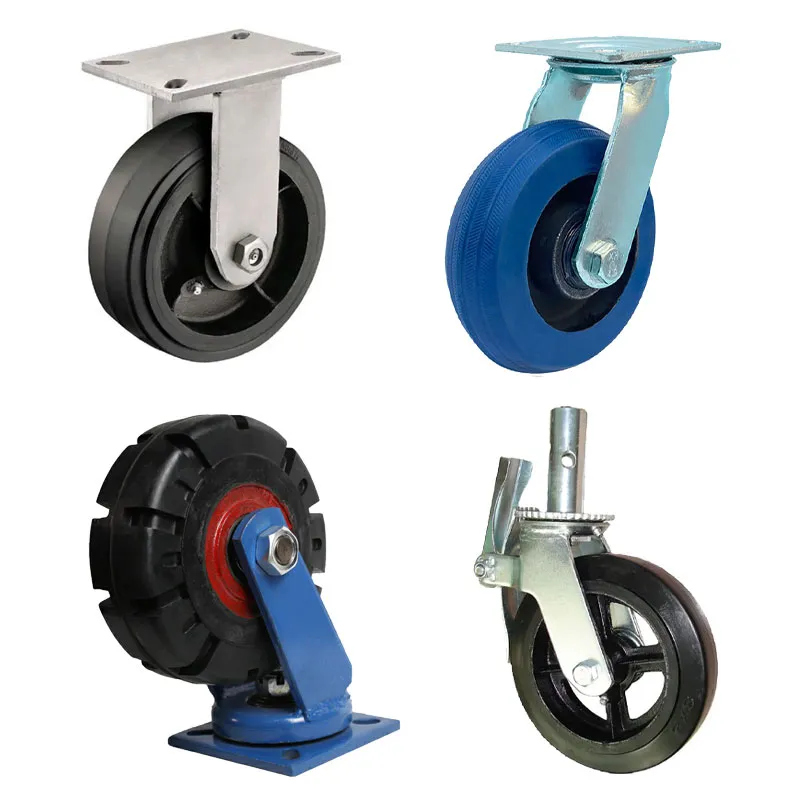
Advantages of Rubber Wheels
- Noise Reduction: The soft nature of rubber makes these wheels much quieter than harder materials, a crucial factor in noise-sensitive environments like hastaneler Ve offices.
- Protection of Flooring: Rubber is less likely to cause damage to flooring surfaces, making it a preferred choice in settings where floor preservation is important.
- Good for Uneven Surfaces: Their shock-absorbing ability makes rubber wheels ideal for use on uneven or rough surfaces, where they can navigate without transferring the impact to the equipment.
Disadvantages
- Lower Load Capacity: Compared to polyurethane, rubber wheels generally have a lower load-bearing capacity, which can limit their use in heavy-duty applications.
- Wear and Tear Concerns: In certain environments, especially where there are sharp objects or abrasive surfaces, rubber wheels may wear out more quickly than polyurethane.
4. Comparative Analysis
In this section, we compare polyurethane and rubber casters across various performance metrics, helping you decide which is best suited for your specific needs.
Load-bearing Capacity
- Polyurethane Wheels: Known for their high load capacity, polyurethane casters can support heavier weights without deforming. This makes them ideal for industrial or heavy-duty applications.
- Lastik Tekerlekler: While rubber casters provide sufficient support for many applications, they generally have a lower load capacity compared to polyurethane. They are better suited for lighter applications where floor protection and noise reduction are priorities.
Kimyasal direnç
- Polyurethane Wheels: These wheels exhibit excellent resistance to chemicals, oils, and greases, making them suitable for environments where exposure to such substances is common.
- Lastik Tekerlekler: Rubber can be sensitive to certain chemicals, which might cause it to degrade faster. This limits their use in environments with potential chemical exposure.
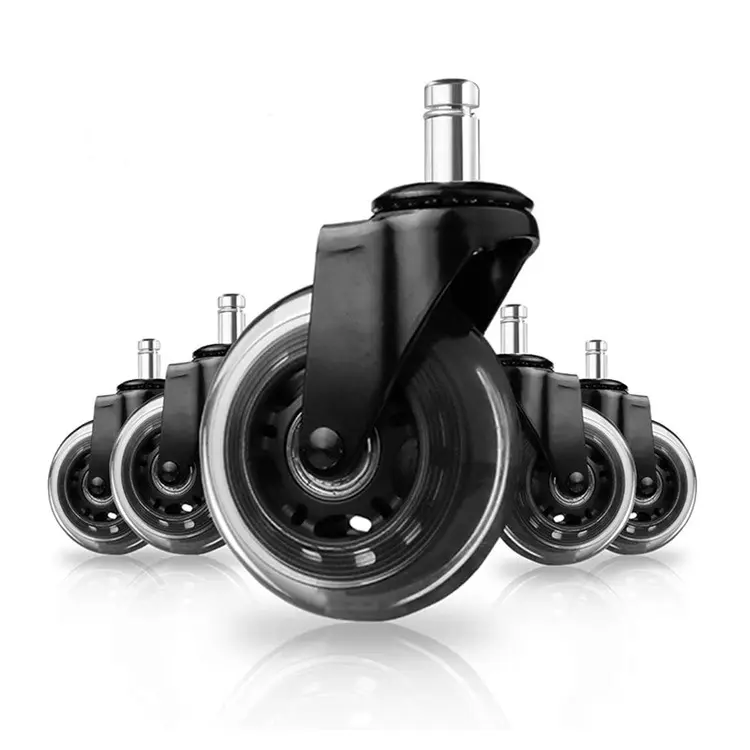
Water Resistance
- Polyurethane Wheels: Polyurethane is generally resistant to water, making it a good choice for moist or damp environments.
- Lastik Tekerlekler: Rubber also performs well in wet conditions, offering good traction and reduced slip risks.
Darbe direnci
- Polyurethane Wheels: While they absorb some impact, polyurethane wheels are less effective than rubber in this regard, especially on very uneven surfaces.
- Lastik Tekerlekler: The elasticity of rubber allows for superior shock absorption, protecting the equipment and providing a smoother movement over rough terrain.
Aşınma Direnci
- Polyurethane Wheels: These wheels are highly resistant to wear and tear, even under heavy use, ensuring a longer lifespan.
- Lastik Tekerlekler: Rubber casters can wear down more quickly, especially in environments with sharp objects or rough surfaces.
Suitability for Different Floor Types
- Polyurethane Wheels: Polyurethane is versatile, performing well on both hard and soft surfaces, without damaging the flooring.
- Lastik Tekerlekler: Best for indoor use, rubber wheels are gentle on floors and provide excellent grip, but they might struggle on very rough outdoor surfaces.
Recommendations for Applications
- For heavy-duty or endüstriyel ortamlar, especially where chemical resistance and high load capacity are required, polyurethane wheels are the preferred choice.
- In settings where noise reduction, floor protection, and shock absorption are key, such as in hospitals or office environments, rubber wheels are more suitable.
5. Sonuç
In conclusion, both polyurethane and rubber casters have their unique advantages and suit different applications. Polyurethane wheels stand out for their durability, high load-bearing capacity, and chemical resistance, making them an excellent choice for industrial and heavy-duty applications. On the other hand, rubber wheels, with their superior shock absorption, noise reduction, and floor protection properties, are ideal for indoor environments like hospitals and offices.
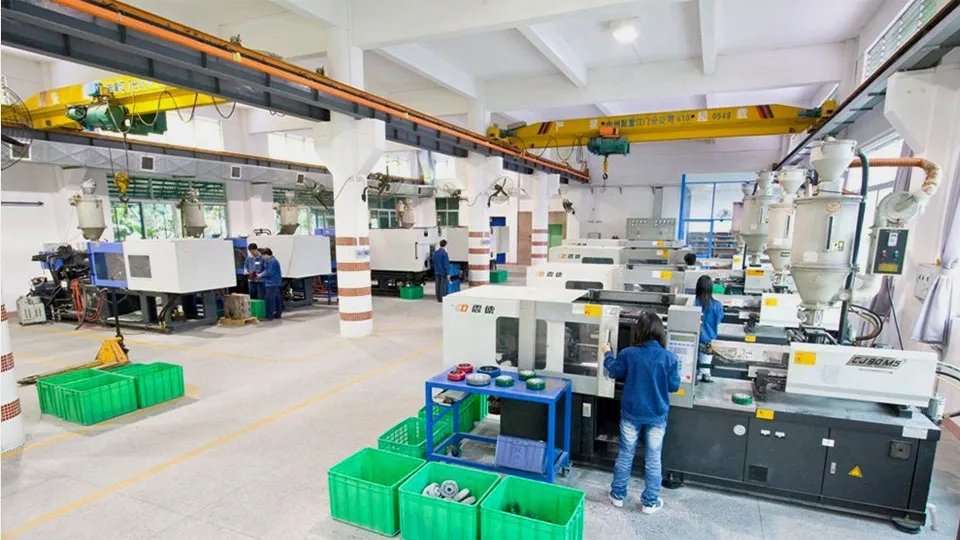
At Bullcaster, we understand that selecting the right caster is crucial for the efficiency and longevity of your equipment. Our expert team is dedicated to providing you with the best solutions tailored to your specific needs. Whether you require the robustness of polyurethane or the gentleness of rubber, we have a wide range of options to fit your requirements.
We invite you to explore our extensive collection of high-quality casters. If you’re unsure which caster is right for your application, our knowledgeable staff is here to assist you with personalized recommendations.
Reach out to us with your inquiries, and let us help you find the perfect caster solution.


